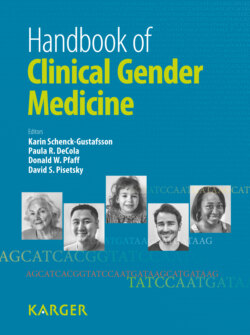Читать книгу Handbook of Clinical Gender Medicine - Группа авторов - Страница 41
На сайте Литреса книга снята с продажи.
Abstract
ОглавлениеIn his book‘Life in the Womb’, Nathanielisz aptly states that’…how we are ushered into life, determines how we leave…’. This, in essence, is the basic idea of fetal programming, namely the understanding that during intrauterine life the stage is set for future health and disease. During fetal life, epigenetic changes aim to prepare the fetus for his future life, and if this preparation turns out to be inadequate the risk of various diseases increases. In this chapter, hormonal and genetic aspects of fetal sex determination will be presented, the effects of exogenous toxins on the fetal environment will be discussed, and the effects of the hormonal milieu on the development of the fetus will be reviewed, including the sexual dimorphous brain. Fetal programming of adult disease will be exemplified by maternal nutrition and stress, and the concept of the pregnant mother as an information window to the outside world will be discussed. Other topics like the impact of the intrauterine environment on future IQ and sexuality will be mentioned, and obstetric implications of fetal programming will be considered.
Copyright © 2012 S. Karger AG, Basel
